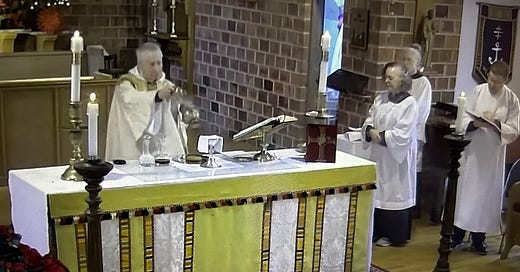People are picking their religion based on their politics
Then they bowed their heads and worshiped the Lord with their faces to the ground. (Nehemiah 8:6)
My concern is what Ryan Burge has pointed to, “People are picking their religion based on their politics, not their politics based on their religion.” We have see it in the comments about the Bishop's sermon as they come from right and left.
Heresy
Bishop John Krumm pointed out in Modern Heresies, that heresy is an attempt to take part of the truth and make it the whole truth. It was said in another way by Father Alexander Schemann, "Heresy, however is always the distortion, the exaggeration, and therefore the mutilation of something true, the affirmation of one 'choice', ...one element at the expense of the others, the breaking up of the catholicity of Truth." I've been reading Father Schmemann and his approach to the heresies we need to avoid include a “secularism— "a negation of worship" and "the progressive and rapid alienation of our culture, of its very foundations, from the Christian experience” and a “Manichean rejection of the world, for an escape into a disincarnate and dualistic ‘spirituality.’”
If you read Episcopal News Service frequently you may notice many stories about issues of justice and programs of service. Not so many about spiritual life or worship. For years there’s been a drift as we justify our existence by “outreach” (an awful word) and performative statements about justice. So, whatever Bishop Budde’s intention was in her call for mercy and her affirmation of the basis of all Christian ethics, "Honoring the inherent dignity of every human being", the storm around it has mostly been a reflection of our political division. As though the primary issue facing humanity is whether they support or oppose President Trump.
The things for which our souls were made
Yet the truth of our life, seen every Sunday as we gather for the Holy Eucharist, is that we participate in the Divine Life in our worship. And there is an organic movement as the People of God flow from that into our families, friendships, work life and civic involvements. And so the divine life know in worship enters into every corner of human existence.
That’s what Thornton is getting at, “We do not embrace religion primarily to improve our morals, but rather undertake the moral struggle in order to improve our Prayer. However interdependent the two may become, the end of man is not purity of heart but the vision of God. The best way to attain the former is by aiming purposefully at the latter.” This is his advancing of Kenneth Kirk’s work in The Vision of God, “the end of man is the vision of God,” … “the doctrine ... has throughout been interpreted by Christian thought at its best as implying in practice that the highest prerogative of the Christian, in this life and the next, is worship; and that nowhere except in this activity will he find the key to his ethical problems.”
I’ll leave all this with two of Evelyn Underhill’s best insights,
One’s first duty is adoration, and one’s second duty is awe and only one’s third duty is service. And that for those three things and nothing else, addressed to God and no one else, you and I and all other countless human creatures evolved upon the surface of this planet were created. We observe then that two of the three things for which our souls were made are matters of attitude, of relation: adoration and awe. Unless these two are right, the last of the triad, service, won’t be right. Unless the whole of your...life is a movement of praise and adoration, unless it is instinct with awe, the work which the life produces won’t be much good.
For the real saint is neither a special creation nor a spiritual freak. He is just a human being in whom has been fulfilled the great aspiration of St. Augustine – “My life shall be a real life, being wholly full of Thee.” And as that real life, the interior union with God grows, so too does the saints’ self identification with humanity grow. They do not stand aside wrapped in delightful prayers and feeling pure and agreeable to God. They go right down into the mess; and there, right down in the mess, they are able to radiate God because they possess Him.
This abides,
Brother Robert, OA
Third Sunday after the Epiphany




